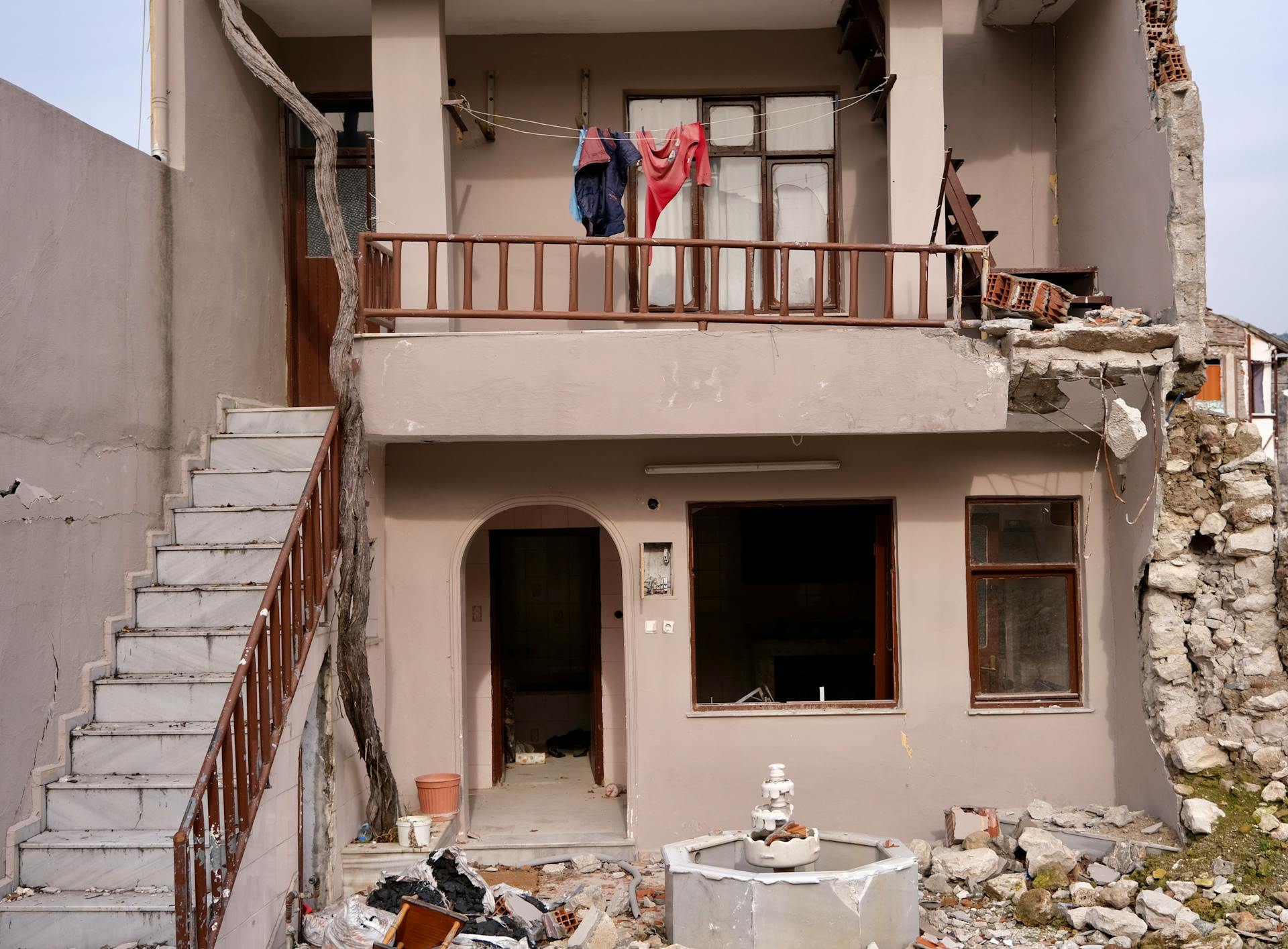
Hurricane damage can be catastrophic, leaving you with a hefty repair bill. Most homeowners' insurance policies do cover damage caused by hurricanes, but there are some exceptions.
Typically, hurricane damage is covered under windstorm coverage, which is usually included in standard homeowners' insurance policies. This means that if a hurricane hits your area, your insurance will likely cover damage to your home's structure, roof, and walls.
However, flood damage is often not covered by standard homeowners' insurance policies, and requires a separate flood insurance policy. This is because flood damage is considered a separate risk from windstorm damage.
Readers also liked: Why Is Anucort-hc Not Covered by Insurance?
Understanding Home Insurance
Home insurance can protect your home against hurricane damage, but it's essential to understand what's covered and what's not. Your home insurance policy can pay for repairs up to your policy's limits if a hurricane causes damage to your home's structure.
Dwelling coverage may pay for repairs to your home's structure, while personal property coverage may pay to repair or replace damaged items. Loss of use coverage may also pay for a hotel, meals, and living expenses above what you'd normally spend if you're unable to live in your home due to damage from a hurricane.
Intriguing read: What Are the Three Main Types of Property Insurance Coverage

However, standard homeowners insurance policies won't cover flood damage, which is a common cause of damage from hurricanes. You need a separate flood insurance policy to protect your home against flooding from the outside.
The amount of insurance you need depends on whether you live in an area prone to floods. You should carry enough insurance coverage to be able to rebuild your home if you reside in a high-risk area.
Some policies may have exclusions or limitations on windstorm coverage, especially for homes in coastal regions, islands, and other hurricane-high-risk areas. In addition to wind damage, hurricanes can cause home destruction in other ways, like catastrophic flooding, which is not typically covered by standard home insurance policies.
Here are some key things to consider when it comes to hurricane insurance:
- Dwelling coverage: pays for repairs to your home's structure
- Personal property coverage: pays to repair or replace damaged items
- Loss of use coverage: pays for a hotel, meals, and living expenses above what you'd normally spend
- Flood insurance: needed to protect against flooding from the outside
- Windstorm coverage: may be included in your policy or available as an add-on
It's essential to review your policy and understand what's covered and what's not to ensure you have the right amount of insurance to protect your home against hurricane damage.
Coverage for Hurricane Damage
Home insurance policies can protect you against hurricane damage in several ways. Your dwelling coverage may pay for repairs up to your policy's limits if a hurricane causes damage to your home's structure. This coverage includes a deductible, and your deductible for a windstorm claim might be set significantly higher than your policy's deductible for other perils.
If your personal belongings are also damaged as a result of the hurricane, your personal property coverage may pay to repair or replace damaged items, up to the limits of your policy. This means that you can replace your damaged furniture, electronics, and other belongings.
In addition to covering damage to your home and belongings, your policy's loss of use coverage may pay for a hotel, meals, and living expenses above what you'd normally spend if you're unable to live in your home due to damage from a hurricane.
Debris removal coverage is also an important aspect of home insurance policies. This coverage provides for expenses related to cleaning up and removing fallen branches, detached pieces from the house, stray objects that were blown into the property, and other materials present because of the natural disaster.
See what others are reading: What Does Personal Property Insurance Cover
Here are some key points to keep in mind about debris removal coverage:
- Debris removal coverage is the part of the policy that provides for expenses related to cleaning up and removing debris.
- Cleaning up debris can be dangerous, so it's useful to have this coverage so that hiring experts is affordable.
Flooding and Storm Risks
Flooding from hurricanes is a major concern for homeowners, especially on the East Coast. Standard homeowners insurance policies won't cover flood damage.
Climate change is making hurricanes more powerful and lingering longer, leading to more destructive and costly storms. This is evident in the increasing severity of hurricanes along the East Coast.
Hurricane Ian, which made landfall in Florida in 2022, was one of the most damaging hurricanes in recent history, with estimated losses of $100 billion. Newsweek estimates that over a million households in the state's hardest-hit areas were without flood insurance.
In rare cases, hurricanes can reach Hawaii and cause significant problems, like Hurricane Iniki in 1992, which generated over $1.8 billion in damage.
Insurance Claims and Payments
If a hurricane causes damage to your home, your insurance company will send you a check for the actual cash value of the damage. This is the first payment you'll receive, and it's based on the current value of your belongings or the cost to repair your home.

Once you've started repairs, you'll need to show proof to your insurance company to receive the remainder of the payment, which will equal the replacement cost. This means you'll get the full amount needed to repair or replace your damaged items.
Your insurance company will send you separate checks for dwelling and personal property coverages, each with its own deductible. For example, the deductible for a windstorm claim might be set higher than your policy's deductible for other perils.
Claim Payments
You'll typically receive the first check from your insurance company for the actual cash value of the damage. This amount is based on the current value of your belongings or the cost to repair your home.
If you've started making repairs, you'll need to show proof to your insurance company to receive the remaining payment to equal the replacement cost.
Here's a breakdown of what you can expect:
- The first check will be for the actual cash value, as outlined in your policy.
- The remainder will be sent once you've provided proof of repairs.
- This process is based on the replacement cost or actual cash value of your policy, as explained in more detail in our article on home policies.
Will Homeowners Policy Cover Tree Removal?
If a tree fell in your yard, your homeowners policy might pay for tree removal if it damaged your house or blocked your driveway. Many policies provide some coverage for tree removal in these cases.
Debris removal coverage is a part of the policy that can help with expenses related to cleaning up and removing fallen branches and other materials. This coverage is useful because cleaning up debris can be dangerous.
Trees and limbs falling in your yard usually aren't covered, but you can still file a claim under your own policy. The policy might pay if the tree was somehow at fault, but if it was just an act of nature, it's unlikely to be covered.
If the tree was your neighbor's, their homeowners insurance might pay if they were at fault, but if not, their policy likely won't pay.
Recommended read: Road Debris Insurance Claim
Sources
- https://www.progressive.com/answers/does-home-insurance-cover-hurricanes/
- https://eberstlaw.com/homeowners-insurance-hurricane-damage/
- https://disastercentral.org/content/damage-your-home-during-storm-what-insurance-covers-what-damage
- https://guidedsolutions.com/does-home-insurance-cover-hurricane-damage/
- https://www.tdi.texas.gov/consumer/storms/home-damaged-faq.html
Featured Images: pexels.com


